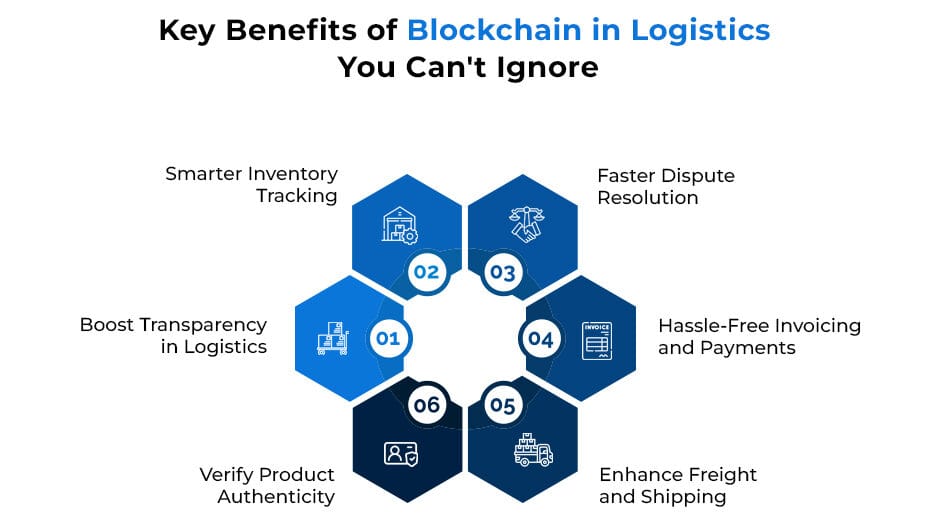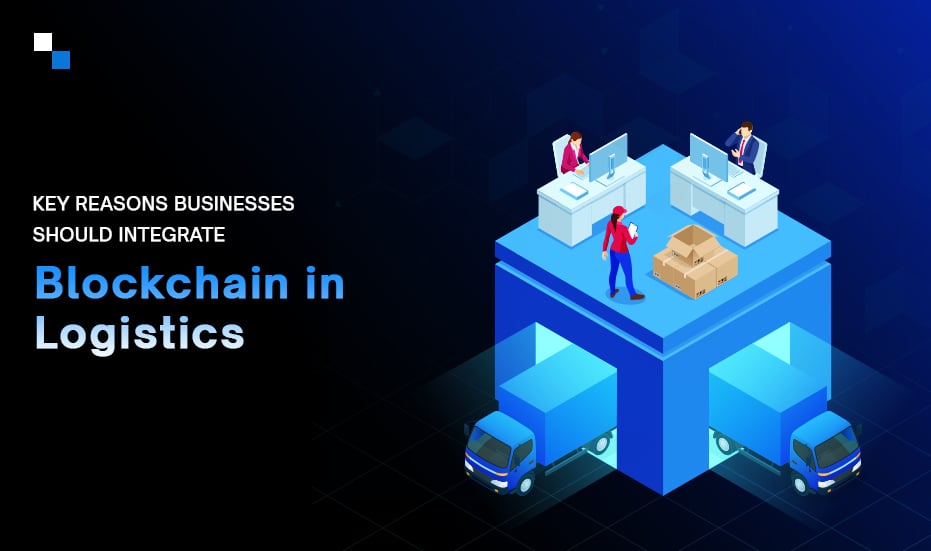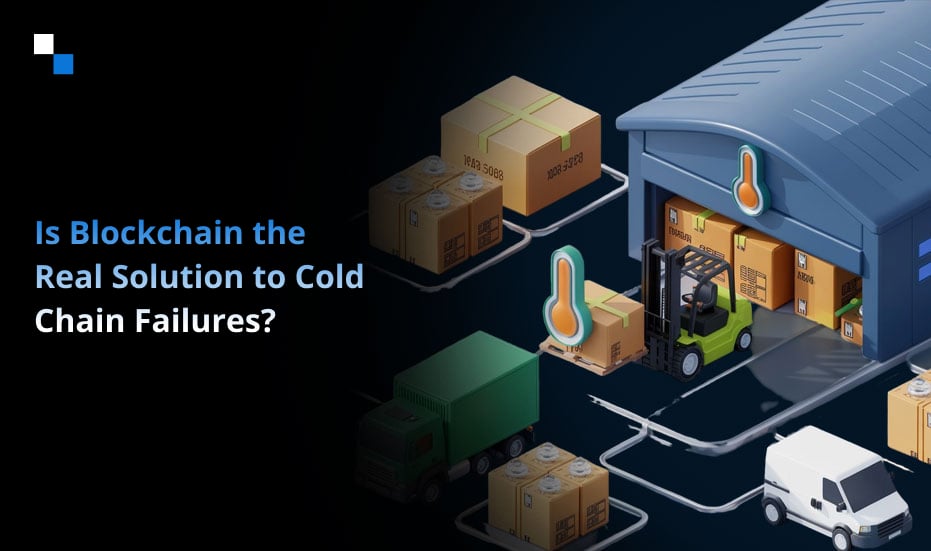
Crypto Wallet Development in Dubai: Who Can Do It, How to Proceed, and Associated Costs
April 2, 2025
Why Invest in Tokenized US Treasury Platform Development Now?
April 3, 2025“The blockchain in logistics market size was valued at USD 19.5 billion in 2023 and is anticipated to grow to USD 900 billion at a CAGR of over 45% between 2024 and 2032.”
Logistics companies not embracing this technology are already losing ground.
Logistics businesses are always under constant pressure to deliver faster, safer, and more transparent services. However, with outdated systems, manual paperwork, and limited visibility across the supply chain, several logistics companies are struggling to meet rising customer expectations. The introduction of blockchain technology in logistics is a game-changer. Whether it’s tracking shipments, verifying documents, or preventing fraud, blockchain offers unparalleled efficiency and trust across the entire supply chain. If you’re wondering why big players around the world are shifting towards blockchain logistics solutions, you’re in the right place.
In this blog, we break down the complexities of the logistics sector and explain how blockchain can help overcome them. We’ve also highlighted the key benefits of using blockchain technology in logistics to help businesses understand why they should not wait any longer to adopt this innovation.
Logistics in 2025: Complexity at an All-Time High
The logistics sector is undergoing a seismic shift. With growing global trade, heightened customer expectations for same-day delivery, complex customs regulations, and increasing supply chain disruptions, from pandemics to geopolitical tensions, the margin for error is razor-thin.
Meanwhile, the stakes are rising:
- Global freight demand is expected to triple by 2050.
- Cargo theft costs companies $30 billion annually worldwide.
- 60% of SMBs report that they have lost up to 15% or greater in revenue due to supply chain delays
So, where does blockchain come in? It offers a solution logistics companies need more than ever: a unified, trusted, real-time digital infrastructure that doesn’t rely on intermediaries.
The Existing Logistics Systems Are No Longer Sustainable
Despite digitization efforts, many logistics systems still rely heavily on siloed databases, manual processes, and third-party intermediaries for verification and data exchange. These outdated practices result in:
- Delayed shipments due to verification bottlenecks.
- Fraud and counterfeiting, especially in high-value goods.
- Inaccurate tracking creates blind spots in the supply chain.
- Inefficient inventory and asset management.
- Poor visibility, limiting decision-making, and customer service.
As global trade scales and consumer demands intensify, these inefficiencies are becoming more than operational headaches, they are strategic threats.
Blockchain- The Ideal Solution to Strengthen Logistics Operations
Blockchain is a distributed digital ledger that securely records transactions across a network. Every time data is entered, be it a shipment update, invoice, or customs clearance, it’s time-stamped, encrypted, and stored in a block that’s connected to the one before it.
In logistics, this means:
- All parties (shippers, carriers, freight forwarders, customs, consignees) can access a shared version of the truth
- Data is tamper-proof and real-time
- Contracts and payments can be automated via smart contracts
Blockchain Isn’t a Trend, It’s Logistics Infrastructure 2.0
If we say in simple words, blockchain is doing for logistics what GPS did for navigation. It’s not optional anymore. It’s essential. As global trade becomes faster, leaner, and more complex, the logistics company must match that pace with secure, transparent, and automated systems.
Blockchain delivers that.
Companies that will understand the importance of blockchain in logistics and supply chain and invest in this innovative approach now will be the ones dominating trade lanes, securing government contracts, and winning loyalty from Fortune 500 shippers.
Let’s go deeper into what blockchain means for logistics businesses.
Top Benefits of Blockchain in Logistics with Real-World Case Studies
The logistics world isn’t without its roadblocks, such as delays, lost data, and a serious lack of transparency, but blockchain technology in logistics is changing the game. From smarter tracking to tamper-proof records, it’s helping companies fix what’s broken. Many early adopters are already seeing the difference. Below, we break down the key benefits of blockchain in logistics and supply chain and share real-world examples of how it’s making waves.

1. Boost Transparency in Logistics
The Challenge:
One of the biggest hurdles in supply chain management is the lack of reliable information. It’s tough to trust what’s happening behind the scenes.
How Blockchain Helps:
Blockchain is a distributed digital ledger that records every transaction or update and stores them across multiple nodes, meaning no one can secretly alter the data. Everyone involved gets access to the same, real-time information. This brings full transparency to every step, from production to delivery.
Real Example: Provenance
Provenance, in collaboration with Fairfood, used blockchain to ensure fair payments to coconut farmers in Indonesia. They made sure companies remained honest about their practices. Provenance also piloted a blockchain project to track tuna fish across supply chains in Indonesia, aiming to combat illegal fishing and unethical labor practices.
Why It Matters:
Blockchain builds trust between companies, reduces invoice disputes, and cuts down auditing costs. It also supports ethical treatment of workers.
2. Smarter Inventory Tracking
The Challenge:
Keeping real-time tabs on inventory is tough, especially when goods move across multiple locations. Delays and mix-ups often follow.
How Blockchain Helps:
Blockchain gives logistics teams instant, reliable data about inventory. Every change is recorded securely, which makes it easy to track products from start to finish.
Real Example: IBM + Food Giants
Walmart, Nestlé, and Unilever worked with IBM to trace food items back to their source. This helps identify exactly where problems occur, especially during recalls.
Why It Matters:
With accurate tracking, companies can act fast in emergencies, avoid mass recalls, and reduce waste, all while boosting safety and trust.
3. Faster Dispute Resolution
The Challenge:
Cargo delays and losses often lead to disputes, which take time and money to resolve, sometimes involving third parties.
How Blockchain Helps:
All records are securely stored on blockchain with timestamps, giving all parties access to the same verifiable information.
Real Example: FedEx
FedEx, the giant US courier company, has integrated blockchain into its dispute resolution process. With verified shipment data on a blockchain, disputes regarding delivery and liability can be resolved more accurately and quickly.
Why It Matters:
With tamper-proof records, resolving issues becomes faster, more transparent, and less costly while keeping business relationships intact.
4. Hassle-Free Invoicing and Payments
The Challenge:
Manual invoicing is slow and error-prone. International payments often take days and require multiple intermediaries.
How Blockchain Helps:
With smart contracts, blockchain automates payments once conditions are met, reducing delays and errors.
Real Example: Visa
Launched in 2019, Visa B2B Connect is designed for high-value corporate cross-border payments and offers related benefits such as faster settlement times, security, and transparency.
Why It Matters:
Payments become faster, cheaper, and more secure, especially across borders. Fraud risks drop, and there’s no need for third-party processors.
5. Enhance Freight and Shipping
The Challenge:
Managing global shipping involves a web of partners, paperwork, and delays. Tracking containers across borders can be a logistical nightmare.
How Blockchain Helps:
Blockchain in shipping logistics offers a secure way to monitor cargo in real-time. It eliminates paperwork, reduces delays, and eliminates miscommunication between parties.
Real Example: Maersk
Maersk, the world’s largest container shipping operator, along with Dutch Customs and the U.S. Department of Homeland Security, has embraced blockchain technology to monitor and manage cargo movement across international borders more efficiently.
Why It Matters:
Transparent, tamper-proof records enable secure, real-time cargo tracking, faster clearances, fraud prevention, and lower costs that further streamline global logistics operations.
6. Verify Product Authenticity
The Challenge:
Consumers and businesses want proof that goods are genuine, but verifying origins is difficult and unreliable.
How Blockchain Helps:
Blockchain in logistics and supply chain tracks every step of a product’s journey and provides a tamper-proof history of its origin and movement.
Real Example: Everledger
Everledger uses blockchain to verify the authenticity of diamonds and their origins. It helps buyers avoid fakes and unethical sources.
Why It Matters:
Whether it’s diamonds or fine wine, blockchain plays a crucial role in bringing transparency to the operations and preventing the major issues of counterfeiting while building consumer trust.

Conclusion
The integration of blockchain technology in logistics is no longer a futuristic concept. It has turned out to be a strategic necessity for businesses aiming to bring transparency and security across their supply chains. Businesses relying on outdated systems filled with paperwork and middlemen may fall behind in the fast-paced technology-driven world.
Whether you’re a small logistics startup or a global shipping giant, it’s time to rethink your strategy and explore blockchain supply chain solutions tailored to your business. Start now, as it will not only help streamline the logistic operations but also build trust with stakeholders.
At Antier, we specialize in blockchain supply chain development tailored for logistics businesses. Whether you’re looking for blockchain supply chain platform development, asset tracking and provenance solutions, smart contract development for logistics, blockchain integration with existing ERP/SCM systems, or decentralised logistics marketplaces, we have the expertise and experience to deliver. Our team is well-versed enough to serve different blockchain use cases in logistics and help businesses grow at a rapid pace.
Let’s future-proof your logistics operations. Contact us for a consultation today!



